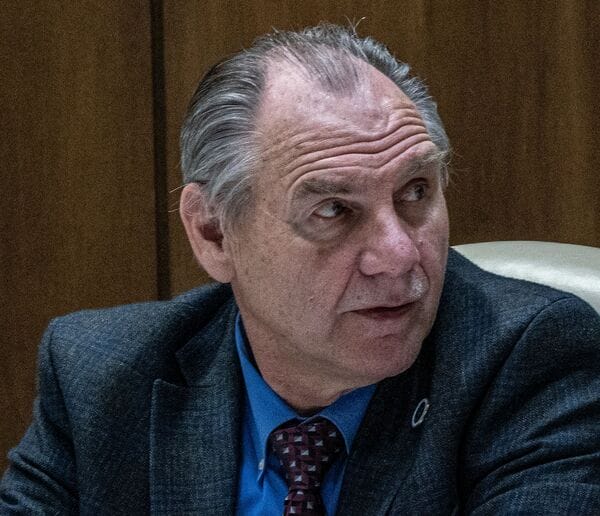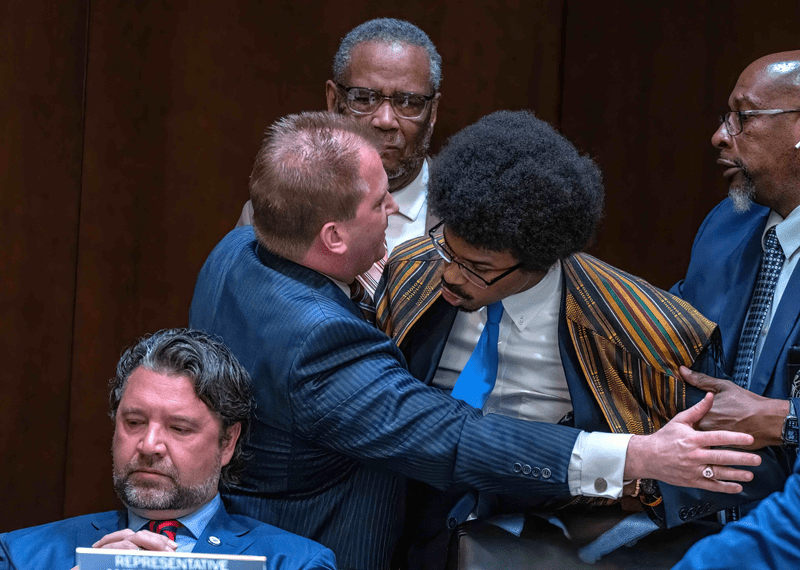A Lebanon man whose son died of an overdose at Trousdale Turner prison is accusing the state’s private-prison operator of “chronic and intentional understaffing” that could have contributed to the death.
“There are not enough guards to run a safe and secure prison. Instead, it’s become a haven for gangs, dealing drugs, and these drugs are killing inmates,” said Tim Leeper in testimony before the House State and Local Government Committee Wednesday.
Leeper told the panel the state should take over Tennessee’s four privately-run prisons and remove CoreCivic because it’s putting profits ahead of prisoners.
The committee followed by unanimously endorsing House Bill 1144 by Republican Rep. Clark Boyd of Lebanon, which would require the inmate population at each CoreCivic-run prison to be reduced 10% if the death rate there is twice as high as the rate at a comparable state-run prison.
State Comptroller audits show Trousdale Turner had a 146% employee turnover rate in 2023, making it more difficult to check on prisoners and avert murders and drug overdoses. Trousdale Turner, which is under a civil rights investigation by the U.S. Department of Justice, has a vacancy rate of 33.7%, compared with 26% at state-run prisons, officials said earlier this year.
Still, the state is seeking a $6.8 million contract increase for the private prison operator despite penalizing the company $44.78 million since 2022 for contractual shortfalls, $15 million in the last half year.
CoreCivic doesn’t pay those penalties but simply forgoes state payments. And Boyd told the Lookout he doesn’t believe the penalties are stiff enough to make CoreCivic, a publicly-traded company, change course.
The Department of Correction consistently defends the prison company, calling it a valuable state “partner” and commending it for trying to bolster staff. The state is having its own problems keeping officers.
Leeper hired a private investigator to look into the cause of son’s death after the young man succumbed to a fentanyl overdose two years at age 25 while serving time for arson Trousdale Turner.
“The more I looked into how it happened the more frustrated I became, because these deaths were extremely preventable,” Leeper said to the Lookout.
The young man suffered a stab wound the first day he was transferred to Trousdale Turner in May 2023 and died just six months later, his father said, adding his son suffered from anxiety because of constant fear he would be knifed again. A correction officer even told him he needed a shank or “butcher” to protect himself, Leeper said.
The elder Leeper called the state’s prison system the “catch-all” for people with mental illness, childhood trauma and substance abuse, a place where society “warehouses people away from us because it makes us feel safe.”
CoreCivic spokesman Ryan Gustin responded to the criticism with an email statement saying prisoner safety, health and well-being is “top priority” and that each facility has emergency response teams to handle medical care. All deaths are reported immediately to the state for investigation.
“All of our Tennessee facilities are subject to multiple layers of oversight by TDOC and independent third parties like the American Correctional Association. TDOC employs full-time, on-site contract monitors at each of our facilities who work to ensure our full compliance with prescribed policies and procedures,” Gustin said.

Yet even with President Donald Trump pardoning crimes and cutting civil rights investigations, the probe into CoreCivic’s Trousdale Turner continues.
Republican Sen. Mark Pody of Lebanon, who is sponsoring the bill’s Senate version, said Thursday he wants to renew the legislature’s correction oversight board, which was removed six years ago by former House Speaker Glen Casada.
Pody said statistics show more deaths occur in CoreCivic prisons than in the rest of the state’s prisons.
“If it can’t get under control, I think we need to do something legislatively so we don’t put people at risk in the prisons,” Pody said.
For a start, Pody said he wants more timely and accurate information so lawmakers can make better decisions. But any bill resurrecting prison oversight will have to wait until next year.
Lawmakers are shutting down committees and trying to adjourn by mid-April so they can skedaddle before the kickback corruption trial for Casada and former staffer Cade Cothren begins. About 20 members have been subpoenaed to testify, and the trial is becoming the elephant in the room.
Their priorities are set, but other than the Boyd-Pody bill, they don’t appear to involve reining in CoreCivic.
Let ’em out?
A week after the Senate Judiciary Committee killed a bill supported by the Tennessee Innocence Project, the measure is coming back to life.
Senate Bill 256, sponsored by Republican Sen. Todd Gardenhire of Chattanooga, would set a procedure for inmates to seek post-conviction relief based on new evidence that wasn’t available at the time of their conviction.
It’s slated to be heard – again – in committee next week. House Bill 601, sponsored by Democratic Rep. Bob Freeman of Nashville, is to be heard Wednesday by the House Judiciary Committee.
The rebirth came after Chairman Gardenhire and other committee members signed a letter this week showing their support for revival.

Republican Sen. Paul Rose’s support was critical after he voted against the measure initially. The Covington Republican said he was persuaded to change his stance after seeing an amendment that sends applications for post-conviction relief through district attorneys.
“This is something that needs to be fixed. We really wanted it, so we worked with the Innocence Project, the district attorneys and got to a really good place,” Rose told the Lookout.
Considering most of the legislature’s criminal justice bills lock people up for good, this is a reversal of sorts. Maybe they don’t have tin man’s disease after all. Nah, what am I thinking?
Remembering Roy Herron
In a shocking turn of events, the Senate Energy, Agriculture and Natural Resources Committee endorsed a Democrat’s bill, one that would require personal liability insurance for watercraft such as jet skis.
Sen. Heidi Campbell of Nashville pushed the measure through the committee when the late Roy Herron’s wife, Nancy, testified about the need to insure personal watercraft because of the risks involved with riding them. A minimum age for driving them had been removed from the bill.

Herron, a West Tennessee lawmaker for more than a quarter-century then a lobbyist, died from a jet ski accident on Kentucky Lake. He was enjoying a family outing with family in July 2023 when an 11-year-old boy plowed into his jet ski at a high rate of speed. Herron died a week later at Vanderbilt hospital.
His son’s friend, Kala McDonald, was seriously injured as well and continues to receive treatment despite returning to medical school, according to Mrs. Herron.
“This financial responsibility provision may seem to some people like a small thing. But it would have meant so much to Kala,” she said, adding insurance costs only about $100.
Mrs. Herron implored the committee to take action, and shockingly, they did. Are we starting to see a new theme here? Maybe not.
“Get off of my cloud”
A heated exchange between Memphis Democratic Rep. Justin Pearson and Sevierville Republican Rep. Andrew Farmer forced the House Criminal Justice Subcommittee into recess Wednesday. Pearson, who has been absent from the hill following the death of his brother by gun suicide in December, brought a bill that would repeal permitless carry in Tennessee, calling on the legislature to act on gun violence instead of offering “some empty thoughts and prayers.”
Farmer replied it was unfair for Pearson to “lecture (the committee) on hard work and convictions” when “every member in this committee has been here this year … but you have not.”
An incensed Pearson shouted back that hard work means passing better laws and fighting “for a state where everybody is able to live more freely from the pain of gun violence that me and my family are experiencing.” He said if Farmer “can’t take that,” he should “learn to shut up.”
Farmer responded that he also has a family and makes sacrifices every year to participate in the legislature. “It’s very common in your party when you disagree with a comment — and I was not disrespectful to you — that you resort to yelling,” Farmer said.

The two lawmakers were separated by their colleagues during the recess.
Pearson issued a statement later saying he has been working on constituent service while dealing with family tragedy.
Hallway talk, though, is that Republicans could be considering a way to punish Pearson for the incident, in part because he approached Farmer in the committee room and had to be restrained.
Conflict between Farmer and Pearson dates back to 2023 when the Sevierville attorney helped lead expulsion hearings against Pearson, Rep. Justin Jones and Rep. Gloria Johnson. It wasn’t pretty as House Republicans expelled Pearson and Jones for leading a gun-control rally on the floor but narrowly voted to keep Johnson.
Memphis and Metro Nashville councils returned Pearson and Jones to the House the following week, and international publicity enabled them to raise nearly $1 million each.
The expulsion left House Republican leaders with more than egg on their faces, and kicking Pearson out again would only come back to haunt them. The problem is this week’s blow-up could have been avoided, plain and simple.
Switching horses
The House version of Republican Sen. Brent Taylor’s bill to investigate and potentially impeach Shelby County District Attorney Steve Mulroy was taken off notice this week, for a supposed technicality.
The Tennessee Journal, though, is reporting that Taylor’s bill has devolved into creation of a disciplinary board to review that actions of district attorneys and court officers.
Asked where the matter stands this week, Taylor promised big doings. But this appears to be an attempt to study the matter rather than go directly after Mulroy, a Democrat, which means the impeachment or expulsion is dead.
Taylor kept running into opposition from Senate leaders who didn’t want to micromanage district attorneys, and others say there wasn’t much to the matter, except Taylor’s dislike for Mulroy.
Nothing like a good tempest in a teapot.
What chemtrails?
Lawmakers outlawed chemtrails last year, those pesky white plumes emitted from jets, which is why we need more skyhawks to survey the heavens. But that wasn’t enough.
Protectors of the atmosphere and everything we breathe wanted to stiffen penalties for entities that spread those lines across the sky.
The House went along with Republican Rep. Monty Fritts’ bill, passing it with ease this session. But the Senate said, “not so fast, my friends.”
Republican Sen. Janice Bowling this week argued that Congress is continuing to fund geo-engineering weather modification efforts while so-called experts claim that aerosol injections into the atmosphere can help stop the “climate crisis” by reducing the intensity of sunlight hitting the Earth.
But alas, the Senate energy and ag committee killed the last chance for Tennesseans to “breathe deep the gathering gloom.”
And after all he’s done
The House voted 73-21 Thursday morning to honor the “estimable” Tennessee Coordinator of Elections Mark Goins for his efforts over the years to run elections – some say into the ground, considering the state ranks near the bottom in election participation.
The resolution prepared by Republican Rep. Tim Rudd of Murfreesboro said Goins worked with the General Assembly to enact laws ensuring “fair, secure, and free elections,” including requiring photo IDs, voting machine vendor ethics regulations and anti-election hacking.
If only he’d been in charge of elections in every state five years ago, we could have avoided the “stop the steal” campaign and the Jan. 6 insurrection.
While Republicans voted overwhelmingly in favor of recognizing Goins – even though it’s not a great practice to congratulate someone until they retire or die – Democrats weren’t as amiable.
Democratic Rep. Bo Mitchell of Nashville told the House chamber, if Goins had been a local school district, he would have been taken over and turned into a charter school.
Look the other way
The Cordell Hull Building is packed these days with folks from across the state coming to lobby lawmakers or, it seems, to hang out and ride the elevators.
One soul, though, apparently decided he’d had enough of the legislature’s shenanigans outside the building and took it upon himself to urinate on the sacred Cordell.
People on the Hill are accustomed to people raising a ruckus or sitting quietly holding 8-by-11 signs, but one wise guy said, “This isn’t peaceful protest but pee-ful protest.”
“Broken glass everywhere, people p—ing on the stairs, you know they just don’t care / I can’t stand the smell, can’t take the noise.” – Grandmaster Flash and the Furious Five: The Message
WRITER’S NOTE: Lookout reporter Cassie Stephenson contributed to this conglomeration.
This article was originally published on Tennessee Lookout under a Creative Commons license CC BY-ND 4.0. Learn more about third-party content on ZanyProgressive.com.





